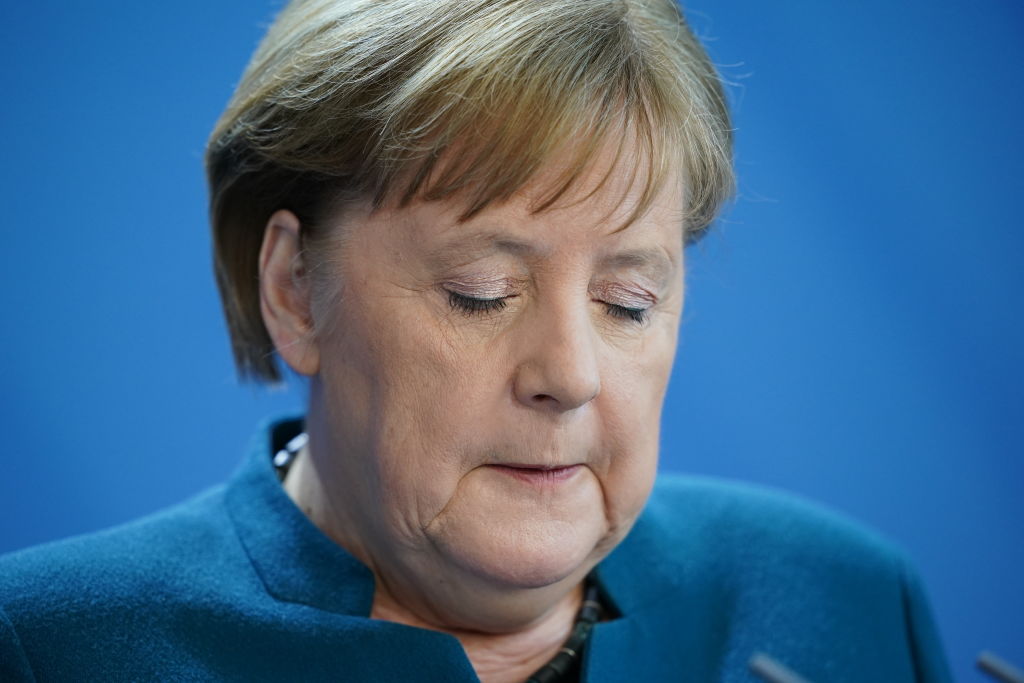When Emmanuel Macron told the French people how his government would tackle coronavirus, he used the word ‘war’ six times. Boris Johnson adopted a similar stance, invoking wartime language to tell Brits we will ‘win the fight’ and beat the enemy’. In her recent televised speech, chancellor Angela Merkel specifically avoided suggesting that Germany is ‘at war’ with the coronavirus. Such over-the-top rhetoric wouldn’t fit Merkel’s persona, and to declare war would unsettle rather than motivate Germans. But the softer language doesn’t mean that this isn’t a pivotal moment in Germany’s history.
The country went into lockdown on March 23 to battle the continuing spread of the coronavirus. For the first time since its foundation after World War Two, fundamental rights are severely restricted; something that might seem only inconsequential elsewhere is an event of historic proportion in a country that was once ruled by dictatorship.
The establishment of civil rights was a particular concern of the authors of the German constitution in 1948/49. German history has shown that unalterable fundamental rights are indispensable and that no government should ever be allowed to abridge them. But this is exactly what is now being done with the banning of even the smallest gatherings and some of the regulations imposed to battle the pandemic, especially the proposed reform of the infection protection act. What sounds like a rather technical law will, in fact, allow Germany’s ministry of health to confiscate products, issue sales bans, close production facilities or force companies to change production through a statutory order.
The authority to implement these measures without requiring a parliamentary vote can turn into a carte blanche. Many Germans are equally fearful. And still, minister Jens Spahn thinks the new infection protection act doesn’t go far enough. His idea to employ mass surveillance via mobile phone tracking was on the table for days until it had to be scrapped last week.
Of course, no one is disputing that governments should not take drastic action so that their countries do not become the next Italy. The pandemic is serious. German politics, however, takes it beyond what’s necessary. At breathtaking speed, rights that have been fought for centuries are being overturned, including the freedom of assembly, the freedom of movement, the freedom to practice a profession, the freedom of trade, and the freedom of travel. All these rights are not suspended for a few days, but an indefinite period — always with the explicit indication that things could get much worse.
Aside from the suspension of fundamental rights, the Bundestag passed legislation that would lay the groundwork for the nationalization of corporations. Peter Altmaier, the minister for economic affairs and a close confidant of Merkel, has long cherished the dream of establishing a subtle form of central planning. He felt powerless because Germany’s corporations have been independent for so long thanks to their productivity and liquidity. Yet in a time of crisis, the economy might fall into the hands of the government, a dream of the big government-loving crowd.
In past decades, German politics appeared slow and methodical. Even small-scale decisions took time because of the need for detailed assessments and because even the most irrelevant interest groups had a chance to weigh in. Berlin was the capital of thoughtful consideration. Now, people await the daily announcements from virologists and members of the government, occasionally even from chancellor Merkel at prime time, and take it as gospel.
What is concerning is how many Germans are simply convinced that all these measures will be reversed quickly when this crisis is over. Particularly in Berlin, many smart people once rejected big government, but now take no issue with civil rights being cut and the market economy being potentially sacrificed. Whoever expresses slight doubts about a possible overreaction is accused of not caring about people’s lives. Everything seems to be without any alternative.
Just in the past few days, many have openly expressed their enthusiasm about how much better the social isolation in China’s dictatorship has worked, implying that Germany or the entire West ought to sacrifice its values to overcome the pandemic. German-British sociologist Ralf Dahrendorf once said: ‘I’ve never become comfortable with a concept of responsibility that prompts us to give up on freedom, so that future generations can get it back. Whoever begins to abridge freedom has renounced and forfeited it.’
Dahrendorf was among the liberal intellectuals that shaped the formative decades of post-war Germany. These liberals insisted on putting trust in the individual, not the state and certainly not authorities. To an extent, Germany might have compensated for its past by being extra-liberal after Hour Zero in May 1945. There is the risk that Germany might never be the same again after the coronavirus.


















